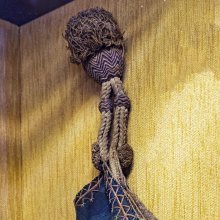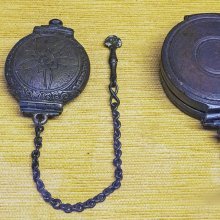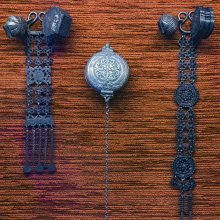Gat: 5 definitions
Introduction:
Gat means something in Hinduism, Sanskrit, Hindi. If you want to know the exact meaning, history, etymology or English translation of this term then check out the descriptions on this page. Add your comment or reference to a book if you want to contribute to this summary article.
Images (photo gallery)
(+2 more images available)
Languages of India and abroad
Sanskrit dictionary
Source: Cologne Digital Sanskrit Dictionaries: Monier-Williams Sanskrit-English Dictionary1) Gat (गत्):—a gata, gati, etc. See √gam.
2) [from gam] b mfn. ifc. ([Pāṇini 6-4, 40]) See adhva-, jana-, dvi-.
[Sanskrit to German]
Sanskrit, also spelled संस्कृतम् (saṃskṛtam), is an ancient language of India commonly seen as the grandmother of the Indo-European language family (even English!). Closely allied with Prakrit and Pali, Sanskrit is more exhaustive in both grammar and terms and has the most extensive collection of literature in the world, greatly surpassing its sister-languages Greek and Latin.
Hindi dictionary
Source: DDSA: A practical Hindi-English dictionary1) Gat in Hindi refers in English to:—(nf) the sound produced while swallowing or gulping a liquid; ~[gata] same as [gata]; quikly, all at once; -[se] quickly, all at once..—gat (गट) is alternatively transliterated as Gaṭa.
2) Gat in Hindi refers in English to:—(a) past, gone; dead; devoid of; pertaining to, in respect of; condition, plight; appearance; a musical time or measure; an air, a tune; —[ka] worthwhile, conforming to a standard; ~[kala] past; ~[prana] dead; lifeless; ~[praya] almost past; —[masa] ultimo: —[bajana] to play an air/a musical tune; —[banana] to reduce to a miserable plight; to give a thorough beating..—gat (गत) is alternatively transliterated as Gata.
...
Nepali dictionary
Source: unoes: Nepali-English DictionaryGat is another spelling for गत [gata].—n. plight; miserable predicament;
Nepali is the primary language of the Nepalese people counting almost 20 million native speakers. The country of Nepal is situated in the Himalaya mountain range to the north of India.
See also (Relevant definitions)
Starts with (+563): Gata, Gata Honem, Gata Karanem, Gata-Kana-Kara-Dini-Dishi, Gata-karanem, Gata-rajya, Gatabala, Gatabandi, Gatabat, Gatabdha, Gatabhagya, Gatabharana, Gatabhartrika, Gatabhava, Gatabhaya, Gatabhi, Gatabhita, Gatabhramti, Gatabuddhi, Gatacetana.
Ends with (+82): Aagat, Abhyagat, Adhvagat, Agagat, Agat, Anagat, Andorogat, Antargat, Anugat, Anujagat, Arakat, Aromang dagat, Asangat, Astangat, Avabhagat, Avagat, Avigat, Bargat, Bhagat, Breeblaarwitgat.
Full-text (+2): Adhvagat, Dvigat, Navagat, Jaga, Jagaj, Samgat, Jagac, Jagad, Jagan, Janagatya, Yugat, Dvaigata, Gatatta, Janagat, Jagadvinasha, Dyugat, Gata, Jagat, Avaga, Yata.
Relevant text
Search found 6 books and stories containing Gat; (plurals include: Gats). You can also click to the full overview containing English textual excerpts. Below are direct links for the most relevant articles:
Rig Veda (translation and commentary) (by H. H. Wilson)
Gati in Theory and Practice (by Dr. Sujatha Mohan)
Gati in classical dance form of Kathak < [Chapter 4 - Practice of Gati]
Dramaturgy in the Venisamhara (by Debi Prasad Namasudra)
Sandhi (the combination of different phases) < [Chapter 4 - Dramaturgy in Veṇīsaṃhāra]
Kathasaritsagara (the Ocean of Story) (by Somadeva)
Cidgaganacandrika (study) (by S. Mahalakshmi)
Part 15 - Fifteen states formed by Jāgrat, Svapna, Suṣupti and Turīya < [Philosophy of Kashmir Tantric System]
The English Plays and Poems of Kailasam < [February 1948]





